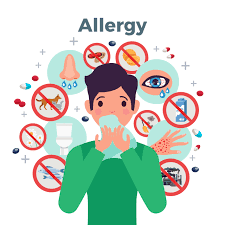Allergies are hypersensitivity reactions by the body to a foreign substance. They can be life-threatening in the event of anaphylaxis. The substances that cause allergies can be proteins from animals or plants, or they may be chemicals that are used in manufacturing, such as latex and formaldehyde. Allergy is a syndrome involving an immune response to a normally harmless substance that triggers the symptoms. Allergic reactions produce symptoms such as rash, hives, and possibly inflammation and swelling of the lips and tongue. That’s why people may spit and sneeze after taking certain medication, such as antihistamines, causing reactions such as swelling of the airway and difficulty breathing. Allergic reactions may also produce symptoms such as shock and loss of consciousness. Everyone has been there, especially if you suffer from holiday season allergies. When you head outside on a brisk Fall day, your nose starts running, your lungs start wheezing, and your eyes water. In a moment, your allergies make your once-cherished, wonderful day a miserable one.
Allergies Symptoms
Allergies can cause mild to severe sensitivity to a wide range of stimuli, such as food, pet dander, household chemicals, and plants. They can give you a wide variety of symptoms, such as an itchy nose, a cough, red eyes, and sneezing. Effects can sometimes last days and weeks and trigger several medical issues, such as asthma and chronic obstructive pulmonary disease. These can be managed with medication, which is safer than an antihistamine because it does not affect healthy cells. The healthy cells are activated by the allergen, which doesn’t affect them but does stop the release of histamines.
Causes of Allergies
Allergies are most likely to occur after exposure to certain triggers, such as food, pollen, and cigarette smoke, and during certain seasons. Although allergies can be caused by a variety of stimuli, most people who develop allergies experience the onset of symptoms every day and during any season, and ultimately fail to make a distinction between what or how long they’ve been exposed to the trigger and whether they reacted, or not. The causes of allergies are varied. Some allergies are caused by the penetration of foreign substances, while others are related to difficulty in the absorption of vitamin D.
Allergies Treatment
Most papers on allergies depend on medicated treatments. Inhaled corticosteroids, hay fever pollen count suppression, and eliminating dust mite allergens are among the most popular treatments. Human sinusitis is caused by a combination of infection and chronic inflammation of the mucus, eosinophilic cilia, and small airways. Among the possible treatments available, the most recommended will be to use a corticosteroid nasal spray which can relieve nasal discharge, nasal congestion, and sinus pressure.
Common Allergies
Common allergens include pollen, pet dander (animal hair), dust mites (tiny bugs), food (e.g., peanuts), and certain medications. Allergies are not contagious; they are caused by your immune system’s overreaction to substances that don’t bother most people. Allergies are caused by defensive reactions of the body to potentially harmful substances or allergens, of which the most common type is pollen. Allergens of concern include pollens, pet dander, molds, certain types of bacteria, drugs, chemicals, and foods of animal origin, of which the most common type is beef. Allergens of concern can also include potentially harmful substances of natural origin, of which the most common type is the classic airborne allergen, pollen.








